Unexpected Financial Crisis Faced by Multiracial Single Parents in Canada
VerifiedAdded on 2023/05/28
|7
|1871
|154
AI Summary
This research is about the unexpected financial crisis faced by a multiracial Single parent in Canada. Read about the challenges faced by multiracial single mothers and what early childhood educators should be aware of.
Contribute Materials
Your contribution can guide someone’s learning journey. Share your
documents today.

Running Head: WORKING WITH FAMILIES 1
Working with families
Name of the Student:
Institution Affiliation:
Working with families
Name of the Student:
Institution Affiliation:
Secure Best Marks with AI Grader
Need help grading? Try our AI Grader for instant feedback on your assignments.
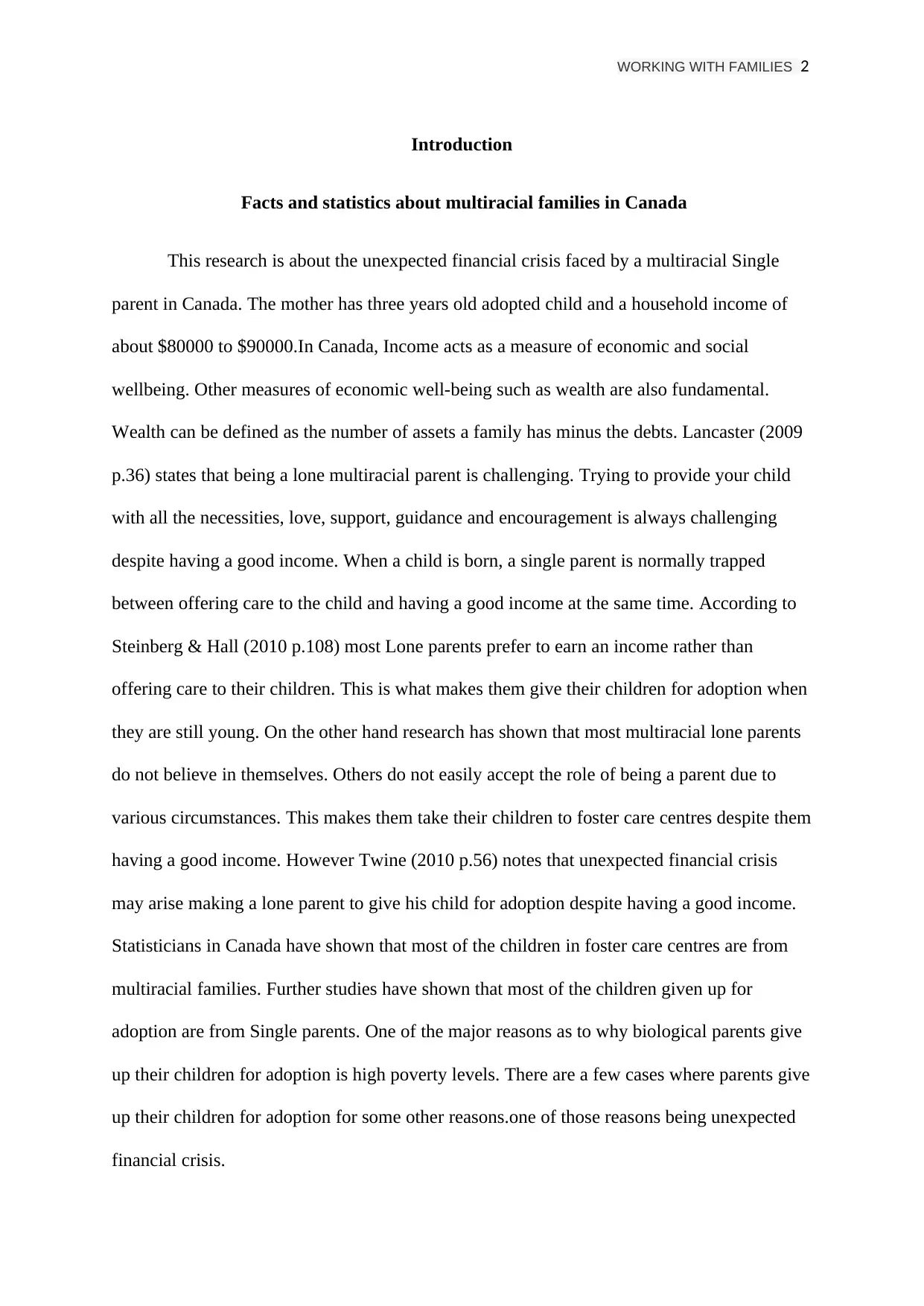
WORKING WITH FAMILIES 2
Introduction
Facts and statistics about multiracial families in Canada
This research is about the unexpected financial crisis faced by a multiracial Single
parent in Canada. The mother has three years old adopted child and a household income of
about $80000 to $90000.In Canada, Income acts as a measure of economic and social
wellbeing. Other measures of economic well-being such as wealth are also fundamental.
Wealth can be defined as the number of assets a family has minus the debts. Lancaster (2009
p.36) states that being a lone multiracial parent is challenging. Trying to provide your child
with all the necessities, love, support, guidance and encouragement is always challenging
despite having a good income. When a child is born, a single parent is normally trapped
between offering care to the child and having a good income at the same time. According to
Steinberg & Hall (2010 p.108) most Lone parents prefer to earn an income rather than
offering care to their children. This is what makes them give their children for adoption when
they are still young. On the other hand research has shown that most multiracial lone parents
do not believe in themselves. Others do not easily accept the role of being a parent due to
various circumstances. This makes them take their children to foster care centres despite them
having a good income. However Twine (2010 p.56) notes that unexpected financial crisis
may arise making a lone parent to give his child for adoption despite having a good income.
Statisticians in Canada have shown that most of the children in foster care centres are from
multiracial families. Further studies have shown that most of the children given up for
adoption are from Single parents. One of the major reasons as to why biological parents give
up their children for adoption is high poverty levels. There are a few cases where parents give
up their children for adoption for some other reasons.one of those reasons being unexpected
financial crisis.
Introduction
Facts and statistics about multiracial families in Canada
This research is about the unexpected financial crisis faced by a multiracial Single
parent in Canada. The mother has three years old adopted child and a household income of
about $80000 to $90000.In Canada, Income acts as a measure of economic and social
wellbeing. Other measures of economic well-being such as wealth are also fundamental.
Wealth can be defined as the number of assets a family has minus the debts. Lancaster (2009
p.36) states that being a lone multiracial parent is challenging. Trying to provide your child
with all the necessities, love, support, guidance and encouragement is always challenging
despite having a good income. When a child is born, a single parent is normally trapped
between offering care to the child and having a good income at the same time. According to
Steinberg & Hall (2010 p.108) most Lone parents prefer to earn an income rather than
offering care to their children. This is what makes them give their children for adoption when
they are still young. On the other hand research has shown that most multiracial lone parents
do not believe in themselves. Others do not easily accept the role of being a parent due to
various circumstances. This makes them take their children to foster care centres despite them
having a good income. However Twine (2010 p.56) notes that unexpected financial crisis
may arise making a lone parent to give his child for adoption despite having a good income.
Statisticians in Canada have shown that most of the children in foster care centres are from
multiracial families. Further studies have shown that most of the children given up for
adoption are from Single parents. One of the major reasons as to why biological parents give
up their children for adoption is high poverty levels. There are a few cases where parents give
up their children for adoption for some other reasons.one of those reasons being unexpected
financial crisis.
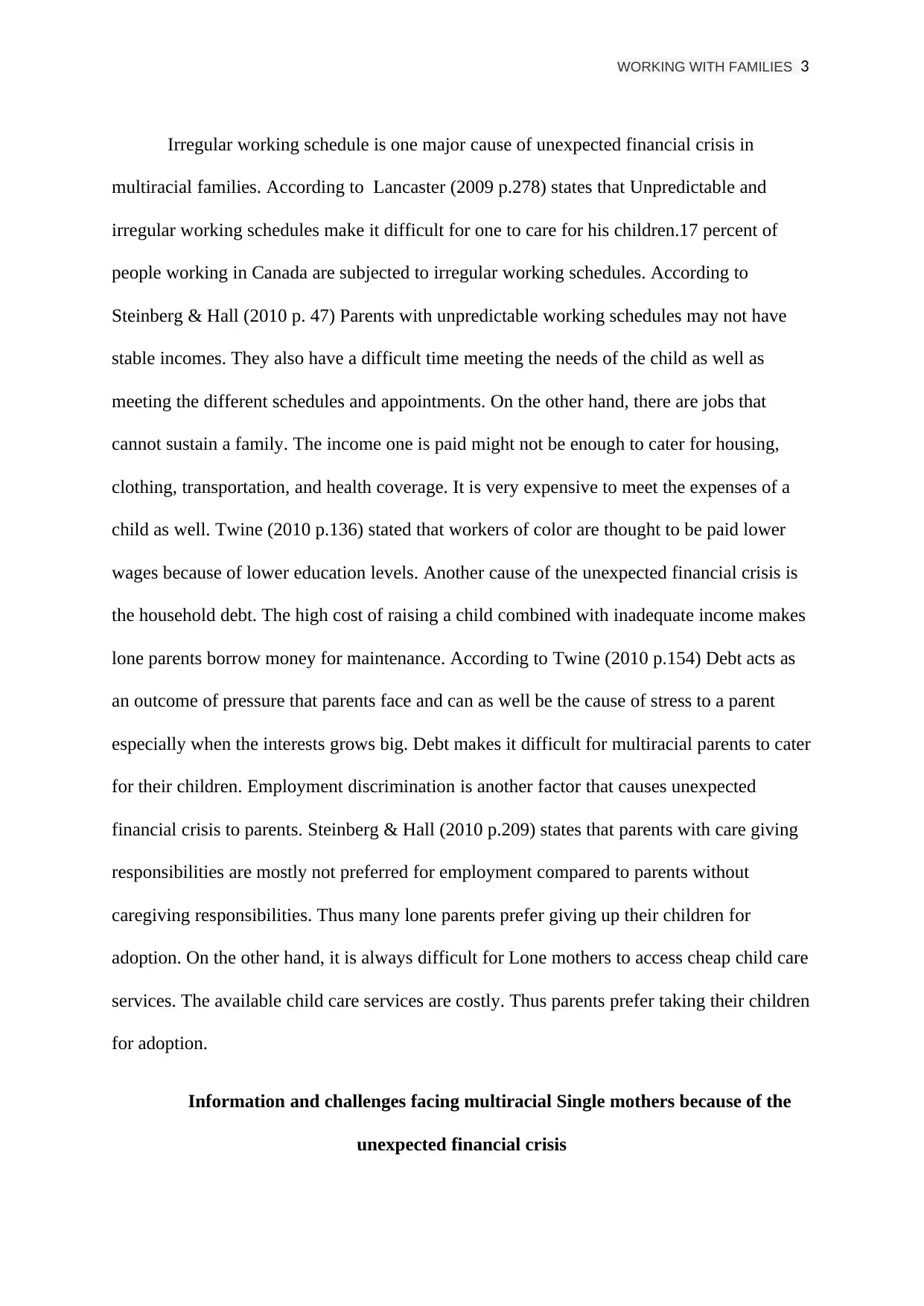
WORKING WITH FAMILIES 3
Irregular working schedule is one major cause of unexpected financial crisis in
multiracial families. According to Lancaster (2009 p.278) states that Unpredictable and
irregular working schedules make it difficult for one to care for his children.17 percent of
people working in Canada are subjected to irregular working schedules. According to
Steinberg & Hall (2010 p. 47) Parents with unpredictable working schedules may not have
stable incomes. They also have a difficult time meeting the needs of the child as well as
meeting the different schedules and appointments. On the other hand, there are jobs that
cannot sustain a family. The income one is paid might not be enough to cater for housing,
clothing, transportation, and health coverage. It is very expensive to meet the expenses of a
child as well. Twine (2010 p.136) stated that workers of color are thought to be paid lower
wages because of lower education levels. Another cause of the unexpected financial crisis is
the household debt. The high cost of raising a child combined with inadequate income makes
lone parents borrow money for maintenance. According to Twine (2010 p.154) Debt acts as
an outcome of pressure that parents face and can as well be the cause of stress to a parent
especially when the interests grows big. Debt makes it difficult for multiracial parents to cater
for their children. Employment discrimination is another factor that causes unexpected
financial crisis to parents. Steinberg & Hall (2010 p.209) states that parents with care giving
responsibilities are mostly not preferred for employment compared to parents without
caregiving responsibilities. Thus many lone parents prefer giving up their children for
adoption. On the other hand, it is always difficult for Lone mothers to access cheap child care
services. The available child care services are costly. Thus parents prefer taking their children
for adoption.
Information and challenges facing multiracial Single mothers because of the
unexpected financial crisis
Irregular working schedule is one major cause of unexpected financial crisis in
multiracial families. According to Lancaster (2009 p.278) states that Unpredictable and
irregular working schedules make it difficult for one to care for his children.17 percent of
people working in Canada are subjected to irregular working schedules. According to
Steinberg & Hall (2010 p. 47) Parents with unpredictable working schedules may not have
stable incomes. They also have a difficult time meeting the needs of the child as well as
meeting the different schedules and appointments. On the other hand, there are jobs that
cannot sustain a family. The income one is paid might not be enough to cater for housing,
clothing, transportation, and health coverage. It is very expensive to meet the expenses of a
child as well. Twine (2010 p.136) stated that workers of color are thought to be paid lower
wages because of lower education levels. Another cause of the unexpected financial crisis is
the household debt. The high cost of raising a child combined with inadequate income makes
lone parents borrow money for maintenance. According to Twine (2010 p.154) Debt acts as
an outcome of pressure that parents face and can as well be the cause of stress to a parent
especially when the interests grows big. Debt makes it difficult for multiracial parents to cater
for their children. Employment discrimination is another factor that causes unexpected
financial crisis to parents. Steinberg & Hall (2010 p.209) states that parents with care giving
responsibilities are mostly not preferred for employment compared to parents without
caregiving responsibilities. Thus many lone parents prefer giving up their children for
adoption. On the other hand, it is always difficult for Lone mothers to access cheap child care
services. The available child care services are costly. Thus parents prefer taking their children
for adoption.
Information and challenges facing multiracial Single mothers because of the
unexpected financial crisis
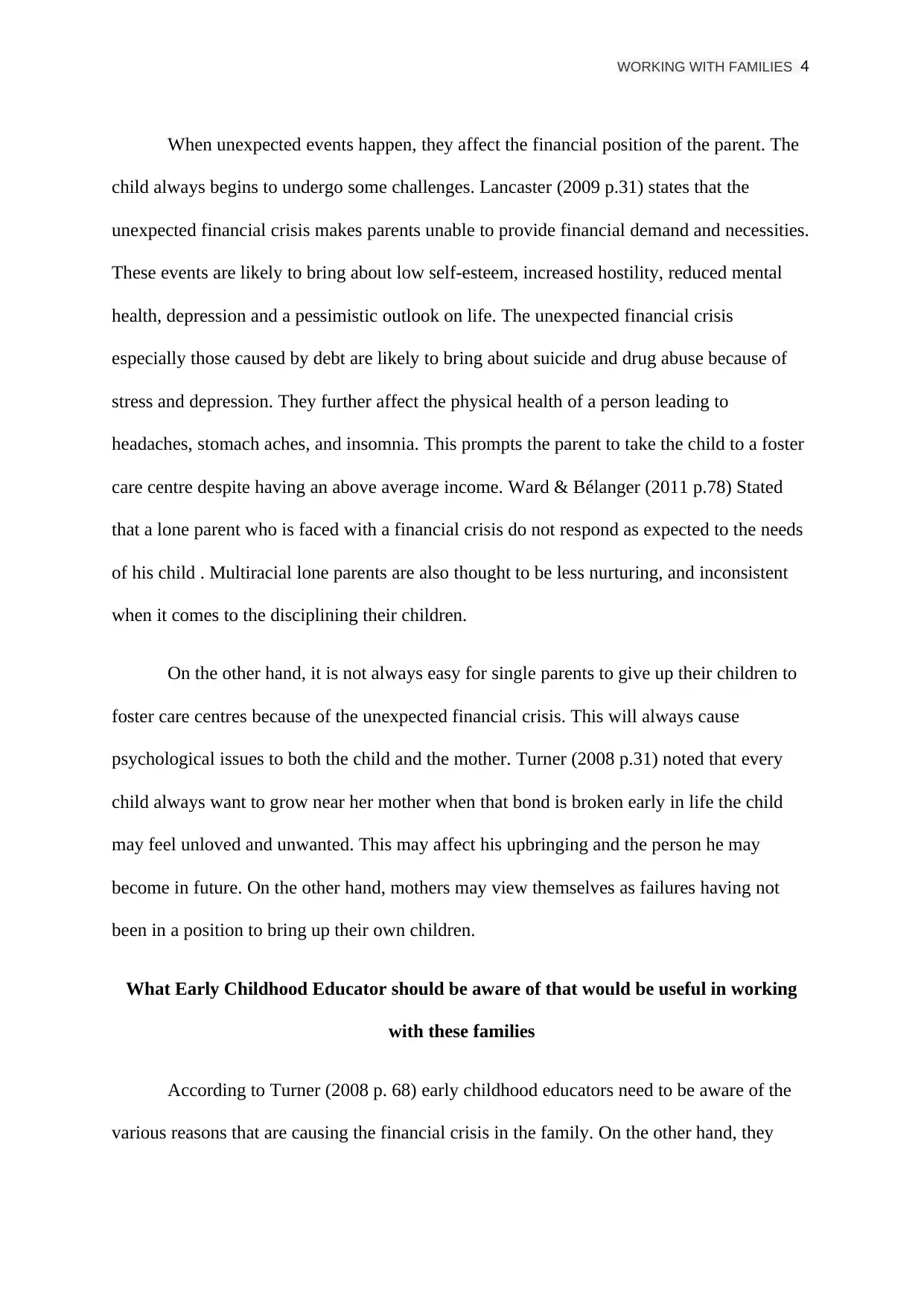
WORKING WITH FAMILIES 4
When unexpected events happen, they affect the financial position of the parent. The
child always begins to undergo some challenges. Lancaster (2009 p.31) states that the
unexpected financial crisis makes parents unable to provide financial demand and necessities.
These events are likely to bring about low self-esteem, increased hostility, reduced mental
health, depression and a pessimistic outlook on life. The unexpected financial crisis
especially those caused by debt are likely to bring about suicide and drug abuse because of
stress and depression. They further affect the physical health of a person leading to
headaches, stomach aches, and insomnia. This prompts the parent to take the child to a foster
care centre despite having an above average income. Ward & Bélanger (2011 p.78) Stated
that a lone parent who is faced with a financial crisis do not respond as expected to the needs
of his child . Multiracial lone parents are also thought to be less nurturing, and inconsistent
when it comes to the disciplining their children.
On the other hand, it is not always easy for single parents to give up their children to
foster care centres because of the unexpected financial crisis. This will always cause
psychological issues to both the child and the mother. Turner (2008 p.31) noted that every
child always want to grow near her mother when that bond is broken early in life the child
may feel unloved and unwanted. This may affect his upbringing and the person he may
become in future. On the other hand, mothers may view themselves as failures having not
been in a position to bring up their own children.
What Early Childhood Educator should be aware of that would be useful in working
with these families
According to Turner (2008 p. 68) early childhood educators need to be aware of the
various reasons that are causing the financial crisis in the family. On the other hand, they
When unexpected events happen, they affect the financial position of the parent. The
child always begins to undergo some challenges. Lancaster (2009 p.31) states that the
unexpected financial crisis makes parents unable to provide financial demand and necessities.
These events are likely to bring about low self-esteem, increased hostility, reduced mental
health, depression and a pessimistic outlook on life. The unexpected financial crisis
especially those caused by debt are likely to bring about suicide and drug abuse because of
stress and depression. They further affect the physical health of a person leading to
headaches, stomach aches, and insomnia. This prompts the parent to take the child to a foster
care centre despite having an above average income. Ward & Bélanger (2011 p.78) Stated
that a lone parent who is faced with a financial crisis do not respond as expected to the needs
of his child . Multiracial lone parents are also thought to be less nurturing, and inconsistent
when it comes to the disciplining their children.
On the other hand, it is not always easy for single parents to give up their children to
foster care centres because of the unexpected financial crisis. This will always cause
psychological issues to both the child and the mother. Turner (2008 p.31) noted that every
child always want to grow near her mother when that bond is broken early in life the child
may feel unloved and unwanted. This may affect his upbringing and the person he may
become in future. On the other hand, mothers may view themselves as failures having not
been in a position to bring up their own children.
What Early Childhood Educator should be aware of that would be useful in working
with these families
According to Turner (2008 p. 68) early childhood educators need to be aware of the
various reasons that are causing the financial crisis in the family. On the other hand, they
Secure Best Marks with AI Grader
Need help grading? Try our AI Grader for instant feedback on your assignments.
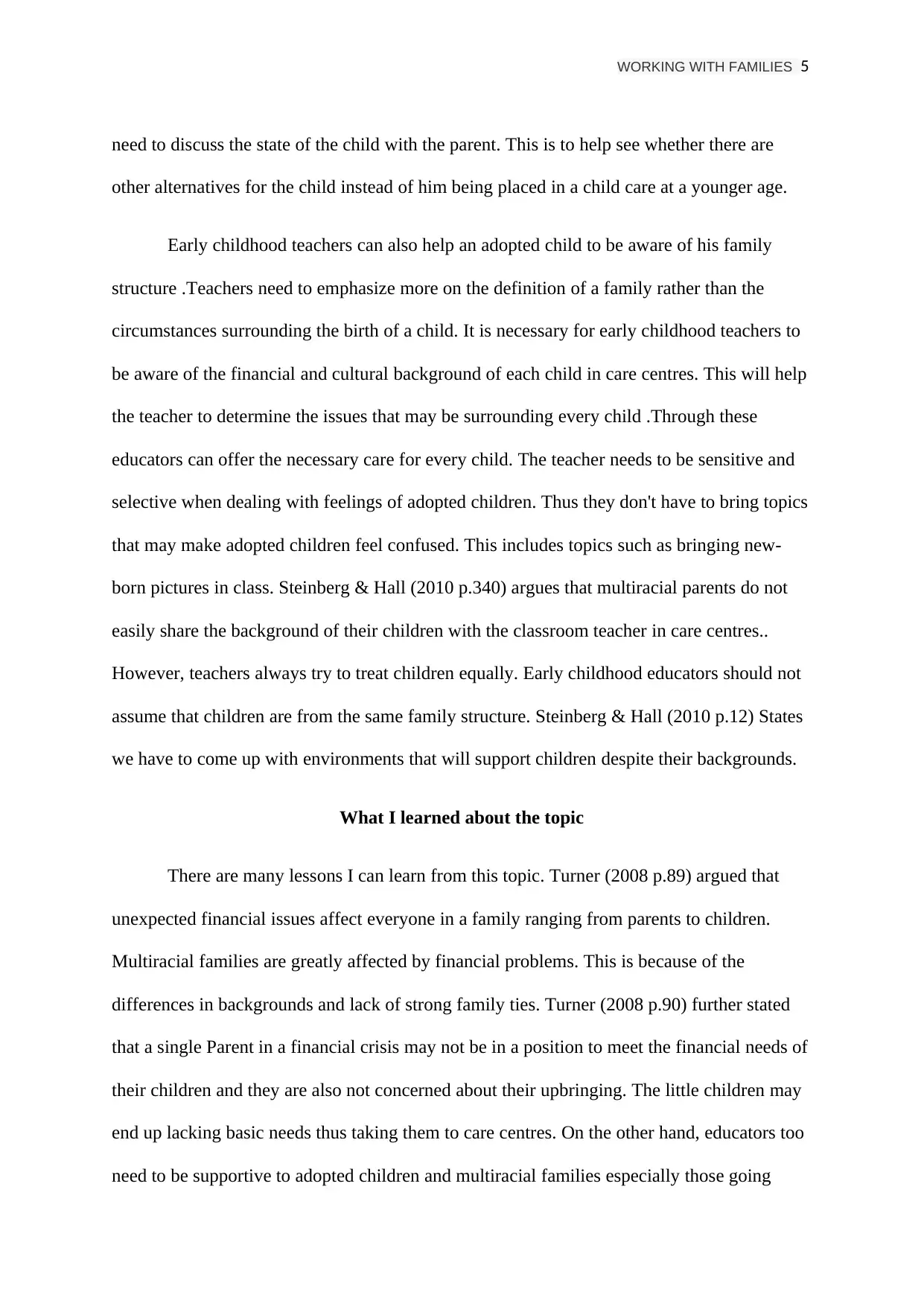
WORKING WITH FAMILIES 5
need to discuss the state of the child with the parent. This is to help see whether there are
other alternatives for the child instead of him being placed in a child care at a younger age.
Early childhood teachers can also help an adopted child to be aware of his family
structure .Teachers need to emphasize more on the definition of a family rather than the
circumstances surrounding the birth of a child. It is necessary for early childhood teachers to
be aware of the financial and cultural background of each child in care centres. This will help
the teacher to determine the issues that may be surrounding every child .Through these
educators can offer the necessary care for every child. The teacher needs to be sensitive and
selective when dealing with feelings of adopted children. Thus they don't have to bring topics
that may make adopted children feel confused. This includes topics such as bringing new-
born pictures in class. Steinberg & Hall (2010 p.340) argues that multiracial parents do not
easily share the background of their children with the classroom teacher in care centres..
However, teachers always try to treat children equally. Early childhood educators should not
assume that children are from the same family structure. Steinberg & Hall (2010 p.12) States
we have to come up with environments that will support children despite their backgrounds.
What I learned about the topic
There are many lessons I can learn from this topic. Turner (2008 p.89) argued that
unexpected financial issues affect everyone in a family ranging from parents to children.
Multiracial families are greatly affected by financial problems. This is because of the
differences in backgrounds and lack of strong family ties. Turner (2008 p.90) further stated
that a single Parent in a financial crisis may not be in a position to meet the financial needs of
their children and they are also not concerned about their upbringing. The little children may
end up lacking basic needs thus taking them to care centres. On the other hand, educators too
need to be supportive to adopted children and multiracial families especially those going
need to discuss the state of the child with the parent. This is to help see whether there are
other alternatives for the child instead of him being placed in a child care at a younger age.
Early childhood teachers can also help an adopted child to be aware of his family
structure .Teachers need to emphasize more on the definition of a family rather than the
circumstances surrounding the birth of a child. It is necessary for early childhood teachers to
be aware of the financial and cultural background of each child in care centres. This will help
the teacher to determine the issues that may be surrounding every child .Through these
educators can offer the necessary care for every child. The teacher needs to be sensitive and
selective when dealing with feelings of adopted children. Thus they don't have to bring topics
that may make adopted children feel confused. This includes topics such as bringing new-
born pictures in class. Steinberg & Hall (2010 p.340) argues that multiracial parents do not
easily share the background of their children with the classroom teacher in care centres..
However, teachers always try to treat children equally. Early childhood educators should not
assume that children are from the same family structure. Steinberg & Hall (2010 p.12) States
we have to come up with environments that will support children despite their backgrounds.
What I learned about the topic
There are many lessons I can learn from this topic. Turner (2008 p.89) argued that
unexpected financial issues affect everyone in a family ranging from parents to children.
Multiracial families are greatly affected by financial problems. This is because of the
differences in backgrounds and lack of strong family ties. Turner (2008 p.90) further stated
that a single Parent in a financial crisis may not be in a position to meet the financial needs of
their children and they are also not concerned about their upbringing. The little children may
end up lacking basic needs thus taking them to care centres. On the other hand, educators too
need to be supportive to adopted children and multiracial families especially those going
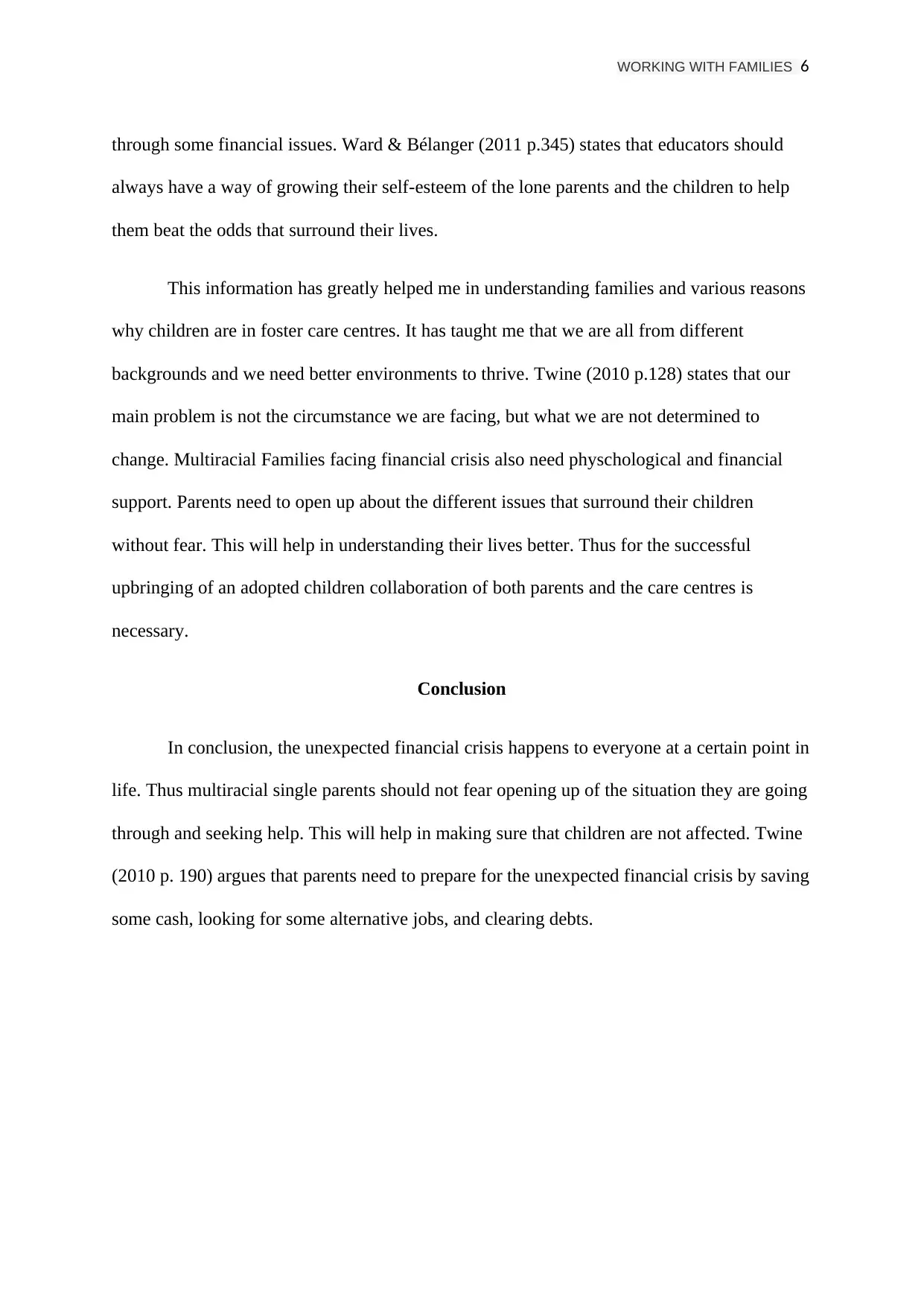
WORKING WITH FAMILIES 6
through some financial issues. Ward & Bélanger (2011 p.345) states that educators should
always have a way of growing their self-esteem of the lone parents and the children to help
them beat the odds that surround their lives.
This information has greatly helped me in understanding families and various reasons
why children are in foster care centres. It has taught me that we are all from different
backgrounds and we need better environments to thrive. Twine (2010 p.128) states that our
main problem is not the circumstance we are facing, but what we are not determined to
change. Multiracial Families facing financial crisis also need physchological and financial
support. Parents need to open up about the different issues that surround their children
without fear. This will help in understanding their lives better. Thus for the successful
upbringing of an adopted children collaboration of both parents and the care centres is
necessary.
Conclusion
In conclusion, the unexpected financial crisis happens to everyone at a certain point in
life. Thus multiracial single parents should not fear opening up of the situation they are going
through and seeking help. This will help in making sure that children are not affected. Twine
(2010 p. 190) argues that parents need to prepare for the unexpected financial crisis by saving
some cash, looking for some alternative jobs, and clearing debts.
through some financial issues. Ward & Bélanger (2011 p.345) states that educators should
always have a way of growing their self-esteem of the lone parents and the children to help
them beat the odds that surround their lives.
This information has greatly helped me in understanding families and various reasons
why children are in foster care centres. It has taught me that we are all from different
backgrounds and we need better environments to thrive. Twine (2010 p.128) states that our
main problem is not the circumstance we are facing, but what we are not determined to
change. Multiracial Families facing financial crisis also need physchological and financial
support. Parents need to open up about the different issues that surround their children
without fear. This will help in understanding their lives better. Thus for the successful
upbringing of an adopted children collaboration of both parents and the care centres is
necessary.
Conclusion
In conclusion, the unexpected financial crisis happens to everyone at a certain point in
life. Thus multiracial single parents should not fear opening up of the situation they are going
through and seeking help. This will help in making sure that children are not affected. Twine
(2010 p. 190) argues that parents need to prepare for the unexpected financial crisis by saving
some cash, looking for some alternative jobs, and clearing debts.
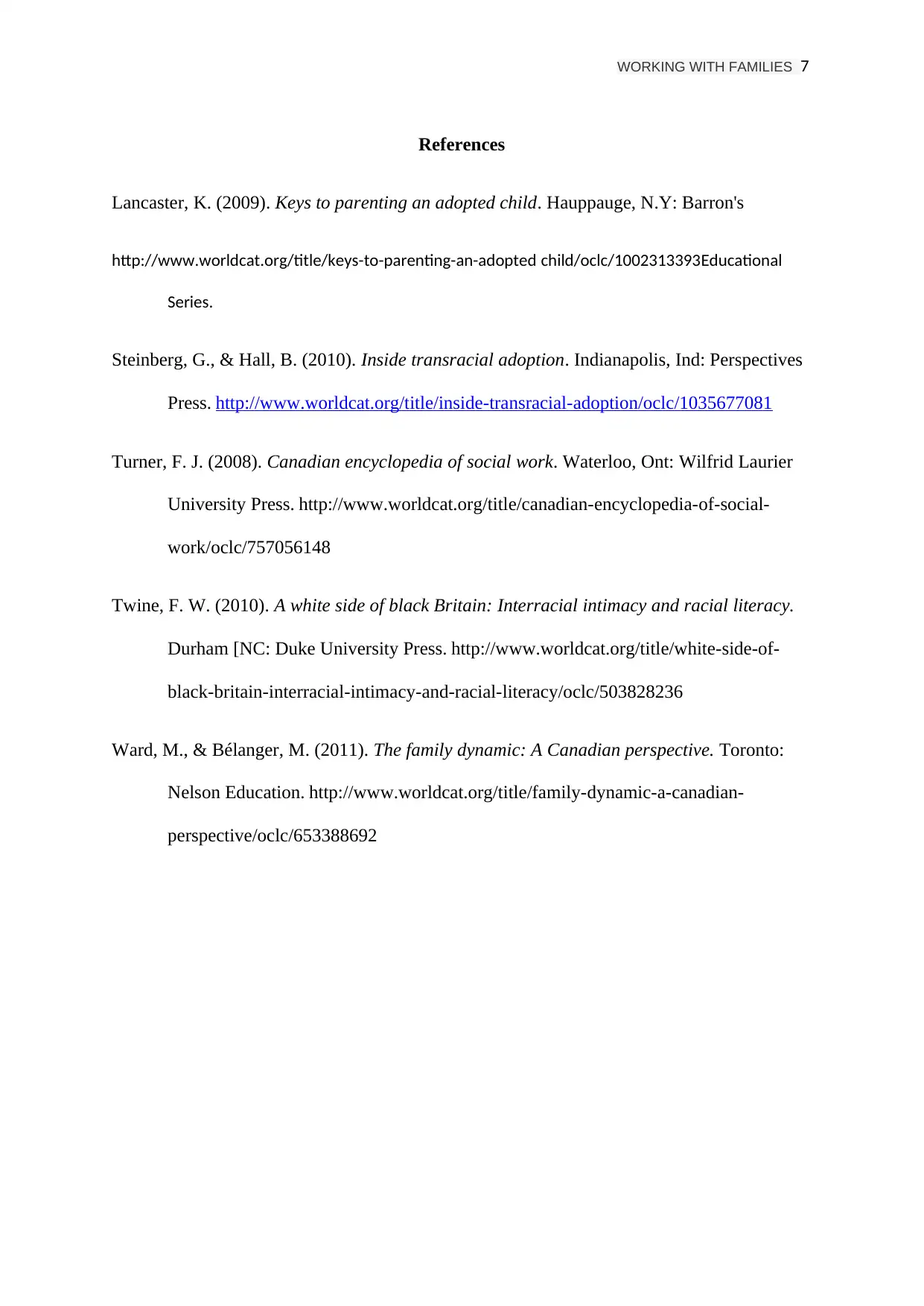
WORKING WITH FAMILIES 7
References
Lancaster, K. (2009). Keys to parenting an adopted child. Hauppauge, N.Y: Barron's
http://www.worldcat.org/title/keys-to-parenting-an-adopted child/oclc/1002313393Educational
Series.
Steinberg, G., & Hall, B. (2010). Inside transracial adoption. Indianapolis, Ind: Perspectives
Press. http://www.worldcat.org/title/inside-transracial-adoption/oclc/1035677081
Turner, F. J. (2008). Canadian encyclopedia of social work. Waterloo, Ont: Wilfrid Laurier
University Press. http://www.worldcat.org/title/canadian-encyclopedia-of-social-
work/oclc/757056148
Twine, F. W. (2010). A white side of black Britain: Interracial intimacy and racial literacy.
Durham [NC: Duke University Press. http://www.worldcat.org/title/white-side-of-
black-britain-interracial-intimacy-and-racial-literacy/oclc/503828236
Ward, M., & Bélanger, M. (2011). The family dynamic: A Canadian perspective. Toronto:
Nelson Education. http://www.worldcat.org/title/family-dynamic-a-canadian-
perspective/oclc/653388692
References
Lancaster, K. (2009). Keys to parenting an adopted child. Hauppauge, N.Y: Barron's
http://www.worldcat.org/title/keys-to-parenting-an-adopted child/oclc/1002313393Educational
Series.
Steinberg, G., & Hall, B. (2010). Inside transracial adoption. Indianapolis, Ind: Perspectives
Press. http://www.worldcat.org/title/inside-transracial-adoption/oclc/1035677081
Turner, F. J. (2008). Canadian encyclopedia of social work. Waterloo, Ont: Wilfrid Laurier
University Press. http://www.worldcat.org/title/canadian-encyclopedia-of-social-
work/oclc/757056148
Twine, F. W. (2010). A white side of black Britain: Interracial intimacy and racial literacy.
Durham [NC: Duke University Press. http://www.worldcat.org/title/white-side-of-
black-britain-interracial-intimacy-and-racial-literacy/oclc/503828236
Ward, M., & Bélanger, M. (2011). The family dynamic: A Canadian perspective. Toronto:
Nelson Education. http://www.worldcat.org/title/family-dynamic-a-canadian-
perspective/oclc/653388692
1 out of 7
Your All-in-One AI-Powered Toolkit for Academic Success.
+13062052269
info@desklib.com
Available 24*7 on WhatsApp / Email
![[object Object]](/_next/static/media/star-bottom.7253800d.svg)
Unlock your academic potential
© 2024 | Zucol Services PVT LTD | All rights reserved.